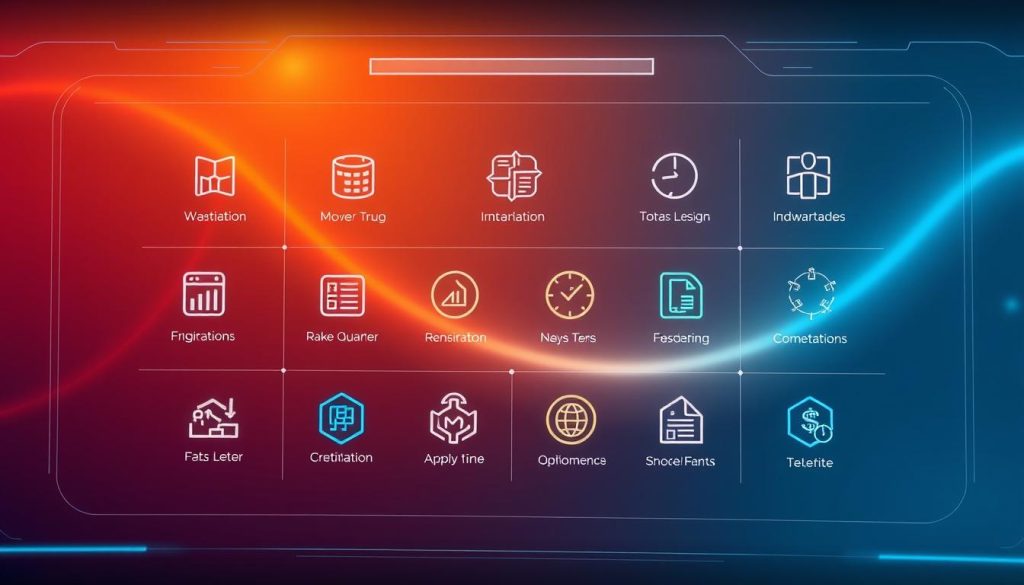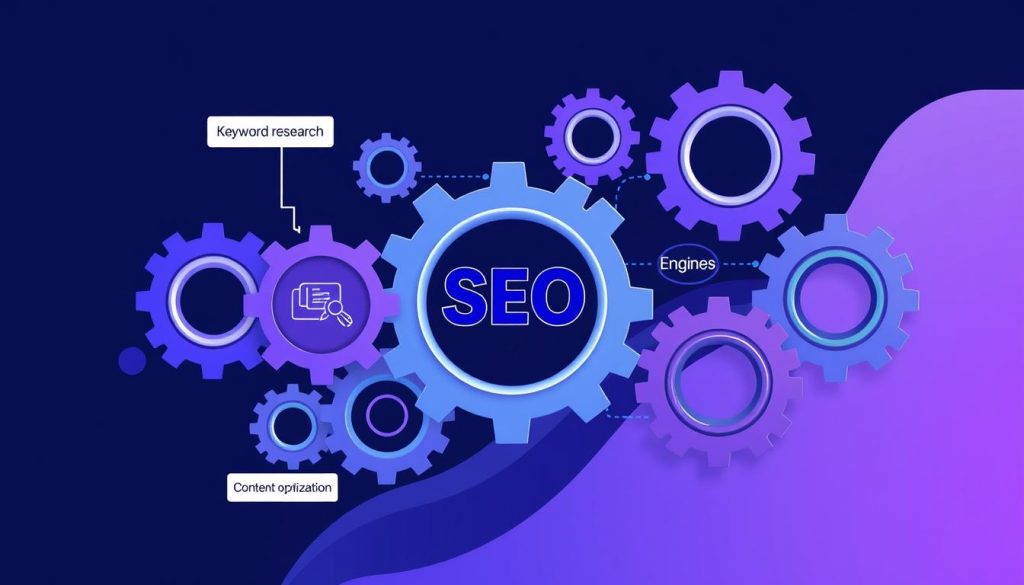Software products are crucial in our digital world. They change how we work, talk, and run businesses. Small businesses can use software marketing to boost growth and reach more people.
This guide explores effective strategies for small businesses. It shows how to make software products more visible and successful. These methods can help enhance your online presence and drive business growth.
Key Takeaways
- Understand the fundamentals of software marketing and its importance for small businesses
- Craft an effective software marketing strategy that aligns with your business goals and target audience
- Optimize your software product for marketing by enhancing user experience and highlighting key features
- Leverage content marketing, SEO, and social media to reach and engage your target customers
- Measure and continuously optimize your software marketing efforts to ensure maximum impact
What is Software Marketing?
Software marketing promotes and positions software products to attract customers and boost sales. It raises awareness, builds brand recognition, and drives revenue for software companies. This strategy is crucial for small businesses in the competitive software industry.
Defining Software Marketing
Software marketing identifies and meets the needs of software users. It focuses on understanding the target audience and their challenges. The process highlights the unique features and benefits of the software product.
Effective strategies use various channels to reach customers. These include content creation, search engine optimization (SEO), social media, and email campaigns.
Importance of Marketing for Small Software Businesses
Marketing helps small software businesses stand out in a competitive market. It allows them to create a strong brand and attract customers. With limited resources, small companies must prioritize their marketing efforts.
A well-crafted software marketing strategy helps reach target audiences effectively. It builds customer loyalty and drives sustainable growth. This approach allows small businesses to compete with larger companies.
“Effective software marketing is the key to unlocking the true potential of small software businesses. It helps them overcome the challenges of a crowded market and thrive in the digital age.”
Crafting an Effective Software Marketing Strategy
A solid software marketing strategy is vital for small businesses to promote their products effectively. It drives customer engagement, increases brand visibility, and boosts sales. This approach combines key components to achieve these goals.
Clear marketing goals form the strategy’s core. These goals should match the business objectives. They help allocate resources and track marketing success.
Understanding the target audience is crucial. Research ideal customers, their pain points, and preferences. This approach creates targeted messaging that resonates with the audience.
Aligning marketing tactics with business objectives enhances strategy effectiveness. Use digital marketing channels like SEO, content marketing, and social media. These tools help reach and engage the target audience.
A well-executed strategy helps small businesses create software marketing strategy for small businesses. It positions products for long-term success in the competitive software market.
| Key Components of an Effective Software Marketing Strategy |
|---|
|

“An effective software marketing strategy is the foundation for small businesses to stand out in the crowded digital landscape and reach their target audience with impactful messaging and relevant offerings.”
Understanding Your Target Audience
Effective software marketing starts with knowing your target audience well. You must identify your ideal customer and understand their challenges. This knowledge helps you create a more compelling marketing message.
Identifying Your Ideal Customer
Create detailed buyer personas to represent your target audience. Consider their demographics, interests, and online behaviors. Look at their daily challenges too.
Use market research, customer interviews, and website analytics. These tools help build a thorough profile of your ideal customer.
Analyzing Customer Pain Points and Needs
Explore your target audience’s problems and unmet needs. What issues are they trying to solve with your software? Which features do they want most?
Use surveys, user testing, and customer interviews. These methods provide valuable insights to shape your marketing strategy.
| Customer Pain Points | Customer Needs |
|---|---|
| Time-consuming data entry | Automated data processing |
| Lack of collaboration tools | Seamless team communication and file sharing |
| Difficulty tracking project progress | Comprehensive project management features |
A deep understanding of your audience helps tailor your marketing efforts. You can address their specific needs and pain points. This approach attracts and retains the right customers for your software business.
Optimizing Your Software Product for Marketing
Great software isn’t enough. It needs optimization for marketing success. This section explores strategies to enhance your software product’s appeal to customers.
Small businesses can attract and retain customers by improving user experience. They can also showcase unique features and benefits effectively.
Enhancing User Experience
User experience (UX) is crucial in software marketing. A smooth, intuitive interface drives customer engagement and satisfaction.
Optimizing software for marketing involves crafting UX to meet audience needs. This includes streamlining navigation and improving responsiveness.
Incorporating user-friendly design elements also enhances the overall experience. These changes can significantly impact customer perception and usage.
Leveraging Software Features and Benefits
Your software’s unique features are key to your marketing strategy. Highlighting software features and benefits helps you stand out in a crowded market.
Identify key advantages like increased productivity or cost savings. Showcase these prominently in your marketing materials.
Improving user experience for software marketing amplifies your software’s features and benefits. This approach can convince potential customers of your product’s value.

“Optimizing your software product for marketing is essential for small businesses looking to stay competitive in today’s digital landscape.”
Focus on enhancing user experience and communicating unique features. This approach primes your product for successful marketing campaigns.
Small businesses can drive customer acquisition and retention through this strategy. Ultimately, it leads to business growth and market success.
Content Marketing for Software Products
Software marketing thrives on captivating content creation. It’s a powerful tool for attracting and educating customers. Engaging content establishes your brand as an industry leader.
Cultivating Compelling Content
Effective software content marketing focuses on your target audience’s needs. This includes informative blog posts, educational videos, and detailed case studies. Interactive tutorials can also showcase your software’s capabilities.
Valuable content builds trust and increases brand awareness. It addresses customer pain points and highlights your software’s strengths. This approach can ultimately boost your sales.
To create engaging software-related content, focus on the following strategies:
- Identify customer pain points and create content that offers solutions to their challenges.
- Showcase the unique features and benefits of your software through interactive demonstrations and detailed product guides.
- Leverage industry insights and trends to position your software as a valuable tool for your customers.
- Collaborate with subject matter experts to produce authoritative and credible content.
- Optimize your content for search engine visibility to reach a wider audience.
Consistently deliver high-quality, valuable content to your audience. This strategy positions your software business as a trusted partner. It also establishes you as a thought leader in your industry.
“Content marketing is the ultimate way to build trust and authority with your target audience. It’s not about selling, it’s about educating and providing value.”
Search Engine Optimization (SEO) for Software Marketing
Small software businesses need SEO for software marketing to boost online visibility. This section covers key SEO aspects, including keyword research for software products. We’ll explore both on-page and off-page SEO for software businesses.
Keyword Research and On-Page Optimization
Thorough keyword research for software products is vital for successful SEO. It helps identify phrases your target audience searches for. This optimization improves your software’s visibility in search results.
On-page SEO for software businesses focuses on optimizing website content and structure. It enhances your site’s relevance and authority for search engines. This includes optimizing meta tags and overall website structure.
Link Building and Off-Page SEO
Off-page SEO for software businesses is crucial for improving online visibility. It involves building high-quality backlinks from reputable sources. These backlinks boost your website’s authority and credibility significantly.
Combining strategic keyword research, on-page optimization, and off-page SEO is key. This approach helps small software businesses attract their target audience. It also drives valuable traffic to their software products.
| SEO Technique | Description | Benefits |
|---|---|---|
| Keyword Research | Identifying the most relevant and high-performing keywords for your software product | Improves visibility in search engine results, targets the right audience |
| On-Page SEO | Optimizing website content, structure, and meta tags for better search engine ranking | Enhances relevance and authority, increases organic traffic |
| Off-Page SEO | Building high-quality backlinks from reputable sources to improve website credibility | Boosts website authority, drives referral traffic, and improves search rankings |
These SEO for software marketing techniques help small software businesses enhance their online presence. They effectively reach their target audience and improve overall visibility.

Software Marketing For Small Businesses
Small software businesses face unique marketing challenges. However, effective strategies can help promote your products to target audiences. Let’s explore key marketing considerations for small software businesses.
Small software businesses have an advantage in agility. Leveraging this flexibility, you can tailor your marketing approach to better suit your specific customer base and their evolving needs. Understanding customer pain points helps position your software as the ideal solution.
Crafting a Targeted Marketing Strategy
A well-crafted strategy is crucial for small businesses. This involves:
- Identifying your ideal customer persona and their unique needs
- Crafting compelling messaging that resonates with your target audience
- Optimizing your software’s user experience and highlighting its key features
- Utilizing content marketing to educate and engage your customers
- Leveraging search engine optimization (SEO) to improve your online visibility
Focusing on these elements helps create an effective marketing strategy. It sets your small business apart from competitors. It also helps promote your products efficiently.
Maximizing Your Marketing Reach
Small software businesses can use various digital channels to expand their reach. These include:
- Investing in social media marketing to connect with your audience
- Implementing email marketing campaigns to nurture leads and drive sales
- Exploring influencer marketing and collaboration opportunities
- Continually measuring and optimizing your marketing efforts
Diversify your marketing approach to stay relevant. This ensures your strategies remain effective in the changing business landscape. Adapt your methods to meet evolving customer needs and market trends.
“The key to successful software marketing for small businesses is to focus on creating a personalized, customer-centric approach that leverages their unique strengths and adaptability.”
Social Media Marketing for Software Products
Social media is crucial for small businesses showcasing software. It helps engage target audiences and build a strong online presence. Software companies can promote products, boost brand awareness, and attract customers through these platforms.
Utilizing Social Media Platforms
Identify platforms that best connect with your target audience. LinkedIn, Twitter, and Facebook offer unique opportunities for software companies. LinkedIn excels in professional networking, while Twitter enables real-time engagement.
Facebook shines in visual storytelling. Each platform has its own strengths for reaching and engaging potential customers.
Engaging with Your Audience
- Create compelling content showcasing your software’s features and benefits.
- Actively engage followers by responding to comments and sharing user-generated content.
- Use social media advertising to reach a wider, targeted audience.
- Collaborate with industry influencers to expand reach and leverage their credibility.
Deliver valuable content consistently to build a loyal following. This positions your company as a trusted expert in the industry.
Genuine connections lead to increased brand loyalty and customer acquisition. These efforts support long-term success in the competitive software market.

“Social media is not just about building buzz and traffic – it’s about building meaningful relationships with potential and current customers.”
Email Marketing for Software Promotion
Email is a powerful tool for software marketing. It helps small businesses nurture leads and promote new features. You can use it to maintain relationships with customers and boost your marketing efforts.
Building Your Email List
A well-curated email list is crucial for successful marketing. Offer valuable content or incentives to encourage sign-ups. Ensure your list contains engaged recipients who have opted-in to receive your emails.
Crafting Compelling Email Content
Create informative and engaging content for your target audience. Use email to market software products by showcasing new features and updates. Share educational content that addresses customer pain points.
Personalize your emails to connect better with subscribers. This approach creates a more meaningful relationship with your audience.
Automating Your Email Campaigns
Use email marketing automation to streamline your promotion efforts. Set up workflows to welcome subscribers and nurture leads. Automate timely updates about product releases or special offers.
Automation saves time and ensures consistent communication with customers. It helps deliver the right message at the right time.
By using these strategies, you can effectively promote your software through email. Build a strong list, craft compelling content, and leverage automation for better results.
“Email marketing is one of the most effective ways to promote your software and stay connected with your customers.”
Influencer Marketing and Collaboration
Influencer marketing boosts software marketing reach and credibility. It’s a powerful strategy for small software businesses to increase product visibility and impact.
Identifying and Partnering with Influencers
Successful influencer marketing depends on finding the right collaborators. These individuals should have a strong following in your target audience. Look for respected industry figures whose values match your brand.
- Research industry-specific influencers and their audience demographics
- Analyze engagement metrics and reach to find the most impactful partners
- Evaluate the influencer’s authenticity and alignment with your brand
After identifying suitable influencers, establish a mutually beneficial partnership. This could involve sponsored content, product reviews, or co-created campaigns. These collaborations tap into the influencer’s expertise and audience.
By leveraging industry leaders’ trust and credibility, you can effectively promote your software products. This approach helps reach new potential customers and expand your market presence.
| Influencer Marketing Benefits | Influencer Marketing Challenges |
|---|---|
|
|
Strategic collaborations with influencers help software companies reach new audiences. These partnerships boost brand credibility and drive measurable marketing results.
Measuring and Optimizing Your Software Marketing Efforts
Tracking software marketing success is crucial. Analytics and key performance indicators (KPIs) help small businesses make data-driven decisions. These tools refine and improve marketing strategies over time.
Analytics and Key Performance Indicators (KPIs)
Measuring software marketing performance involves tracking various KPIs. These provide insights into campaign effectiveness. Essential KPIs to consider include:
- Website traffic and user engagement metrics
- Lead generation and conversion rates
- Social media engagement and reach
- Email marketing open and click-through rates
- Return on investment (ROI) for various marketing channels
Monitoring these KPIs helps businesses understand their audience’s preferences. It reveals which marketing efforts resonate and which need improvement.
Continuous Improvement and Iteration
KPI insights help optimize software marketing strategies. This may involve tweaking content, adjusting targeting, or reallocating resources. Approach software marketing as an iterative process.
Constantly test, measure, and refine your approach. This maximizes impact and return on investment.
| KPI | Description | Benchmark |
|---|---|---|
| Website Traffic | The number of visitors to your software’s website | 1,000 unique visitors per month |
| Lead Conversion Rate | The percentage of website visitors who become leads | 5-10% conversion rate |
| Email Open Rate | The percentage of recipients who open your email campaigns | 20-30% open rate |
| Social Media Engagement | The level of interaction (likes, comments, shares) on your social media posts | 10-15% engagement rate |
| Return on Investment (ROI) | The ratio of revenue generated to the cost of marketing efforts | 3:1 or higher ROI |
Consistently measuring software marketing performance is key. Analyzing software marketing KPIs provides valuable insights. Optimizing software marketing strategies ensures strong returns on investment.
Conclusion
Software marketing is a powerful tool for small businesses. It can boost visibility, growth, and success for your products. A data-driven strategy helps you reach your target audience effectively.
We’ve explored key elements of software marketing. These include understanding your audience and creating compelling content. Leveraging SEO and social media platforms is also crucial.
Small businesses can succeed by mastering these strategies. They can position their products for long-term growth and stay competitive.
Remember, there’s no one-size-fits-all approach to software marketing. Constant evaluation and adaptation are necessary. Understanding your customers’ changing needs is vital.
By embracing this mindset, you can refine your tactics. This will help unlock your software products’ full potential.




